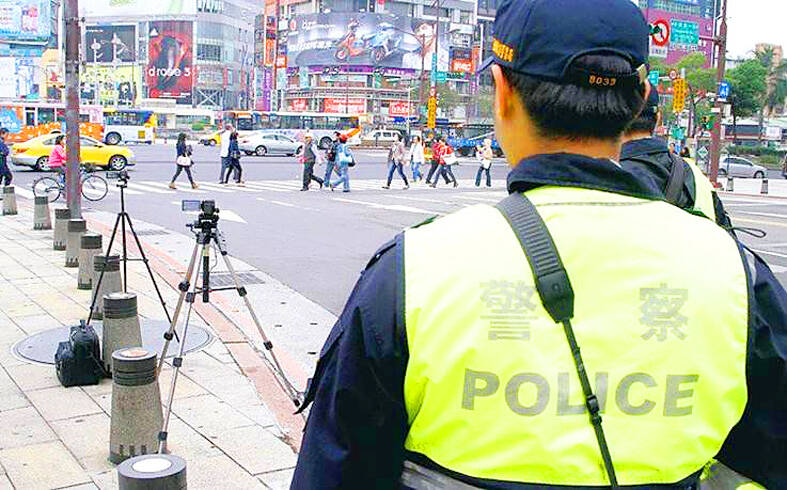The National Police Agency (NPA) is today launching a nationwide traffic enforcement campaign to ensure drivers give way to pedestrians at crosswalks.
Police are to increase monitoring in the hope that drivers and pedestrians treat each other with courtesy and abide by traffic laws, the agency said yesterday.
Under an amendment by the Ministry of Transportation and Communications, which took effect on March 31, drivers of small passenger vehicles who fail to yield to pedestrians on crosswalks face a fine of NT$3,600 (US$117.11), up from NT$2,000, while drivers of large commercial vehicles face a fine of NT$3,600, up from NT$2,800, the amendment says.

Photo: Yao Yueh-hung, Taipei Times
The fine for motorcyclists is unchanged at NT$1,200.
The campaign also focuses on strictly enforcing regulations concerning not yielding, not stopping at intersections without signs, illegal parking and obstacles placed on roads, the agency said.
Police reported 30,717 cases in which drivers did not yield to pedestrians or the visually impaired at crossings or when turning from January to last month, up from 12,893 cases during the same period last year, it said.
The 138 percent increase in such contraventions indicated that while enforcement became stricter, citizens’ awareness of the rules should be heightened, it said.
In related news, the NPA released statistics showing that police agencies reported 15,016,547 traffic offenses last year, a 33 percent increase from 2018 and the highest number in five years.
Illegal parking was the No. 1 traffic contravention, comprising 30 percent of all cases, the agency said.
That was followed by exceeding the speed limit of 60kph on regular roads and running red lights, at 24.1 percent and 9.8 percent of all cases respectively.
Compared with 2021, there was mainly an increase in three types of traffic contraventions: cases involving drivers not following the traffic rules when making turns rose by 328,369; those caught running a red light increased by 187,167; and those not yielding to others with right of way rose by 125,902.
In terms of percentage, cases involving people not fastening their seat belts increased by 77.34 percent — the most among all cases.
However, when compared with 2018, the largest increase in cases was for illegal parking, which reached 727,596.
Compared with 2018, cases involving people using mobile phones or computers while driving rose 169.38 percent — the largest percentage increase among traffic offenses. Drunk driving dropped 38.34 percent, which was the largest percentage decrease.
Car drivers’ top five traffic offenses last year were: illegal parking (3,090,588 cases), exceeding the 60kph speed limit (2,530,124 cases), failure to follow the rules when making turns (849,062 cases), running a red light (566,496 cases) and not yielding to those with right of way (209,397 cases).
The top five traffic offenses for motorcyclists were the same as for car drivers: illegal parking (1,396,968 cases), exceeding the 60kph speed limit (1,091,253 cases), running a red light (909,951 cases), failure to follow the rules when making turns (616,282 cases) and not yielding to those with right of way (458,823 cases).

CHAOS: Iranians took to the streets playing celebratory music after reports of Khamenei’s death on Saturday, while mourners also gathered in Tehran yesterday Iranian Supreme Leader Ayatollah Ali Khamenei was killed in a major attack on Iran launched by Israel and the US, throwing the future of the Islamic republic into doubt and raising the risk of regional instability. Iranian state television and the state-run IRNA news agency announced the 86-year-old’s death early yesterday. US President Donald Trump said it gave Iranians their “greatest chance” to “take back” their country. The announcements came after a joint US and Israeli aerial bombardment that targeted Iranian military and governmental sites. Trump said the “heavy and pinpoint bombing” would continue through the week or as long

TRUST: The KMT said it respected the US’ timing and considerations, and hoped it would continue to honor its commitments to helping Taiwan bolster its defenses and deterrence US President Donald Trump is delaying a multibillion-dollar arms sale to Taiwan to ensure his visit to Beijing is successful, a New York Times report said. The weapons sales package has stalled in the US Department of State, the report said, citing US officials it did not identify. The White House has told agencies not to push forward ahead of Trump’s meeting with Chinese President Xi Jinping (習近平), it said. The two last month held a phone call to discuss trade and geopolitical flashpoints ahead of the summit. Xi raised the Taiwan issue and urged the US to handle arms sales to

State-run CPC Corp, Taiwan (CPC, 台灣中油) yesterday said that it had confirmed on Saturday night with its liquefied natural gas (LNG) and crude oil suppliers that shipments are proceeding as scheduled and that domestic supplies remain unaffected. The CPC yesterday announced the gasoline and diesel prices will rise by NT$0.2 and NT$0.4 per liter, respectively, starting Monday, citing Middle East tensions and blizzards in the eastern United States. CPC also iterated it has been reducing the proportion of crude oil imports from the Middle East and diversifying its supply sources in the past few years in response to geopolitical risks, expanding

Pro-democracy media tycoon Jimmy Lai’s (黎智英) fraud conviction and prison sentence were yesterday overturned by a Hong Kong court, in a surprise legal decision that comes soon after Lai was jailed for 20 years on a separate national security charge. Judges Jeremy Poon (潘兆初), Anthea Pang (彭寶琴) and Derek Pang (彭偉昌) said in the judgement that they allowed the appeal from Lai, and another defendant in the case, to proceed, as a lower court judge had “erred.” “The Court of Appeal gave them leave to appeal against their conviction, allowed their appeals, quashed the convictions and set aside the sentences,” the judges